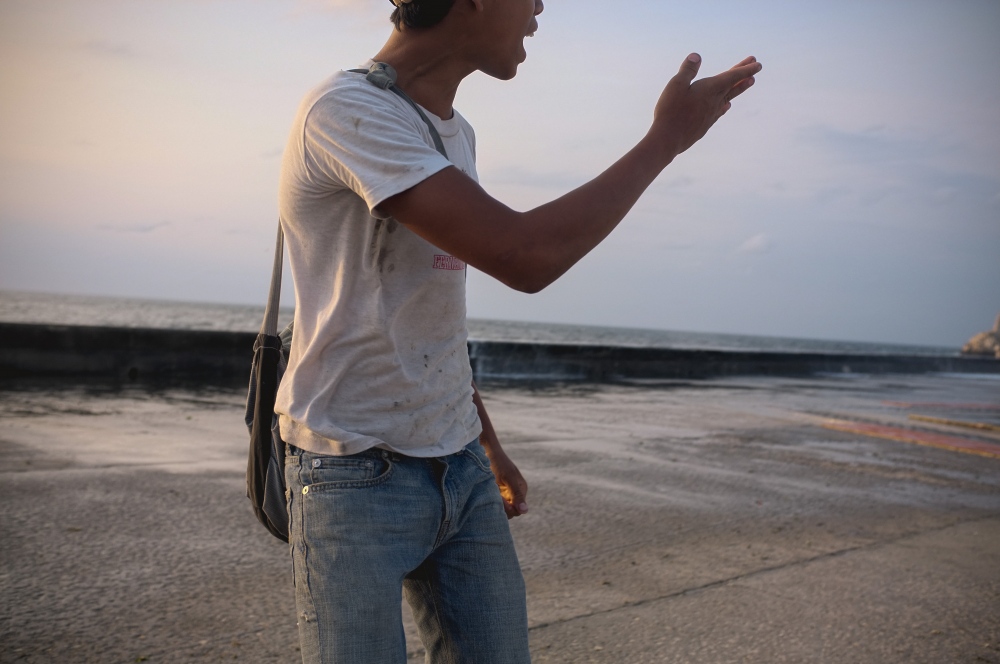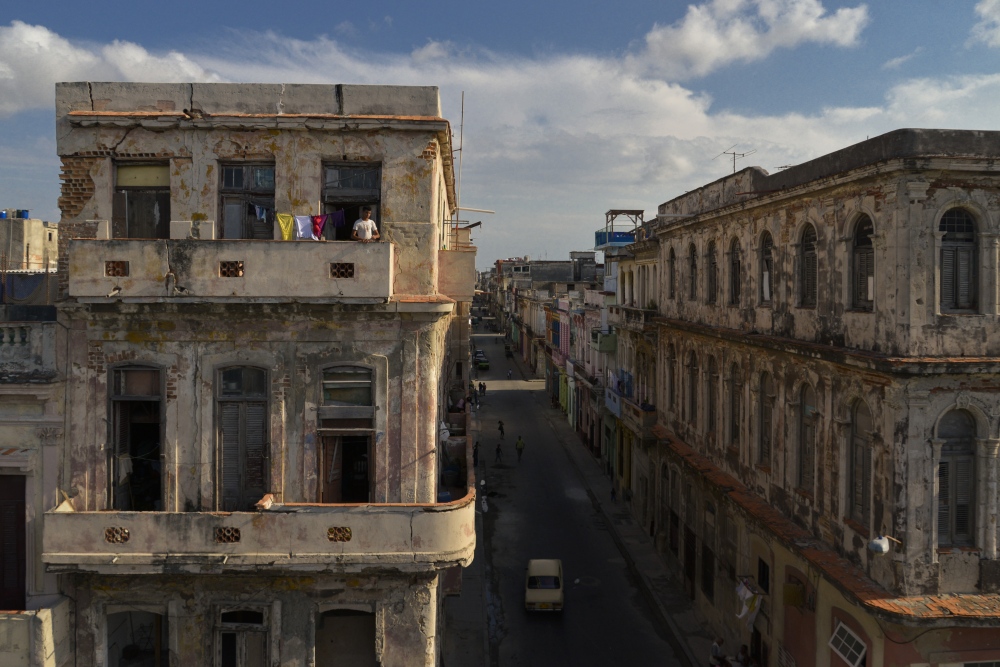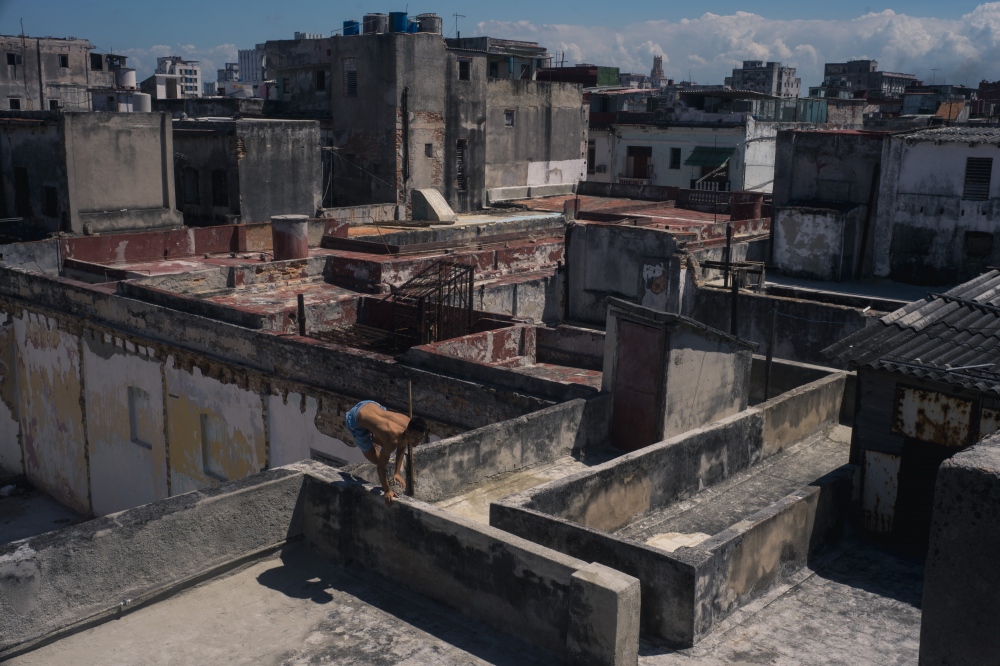Wrapped in a thick blanket of aesthetic nostalgia, Havana is the throbbing heart of Cuba. The streets shimmer with a mix of salty air and humidity. At noon the oppressive sun slows down time to a staggering hum and mostly everyone is affected by a heat paralysis. Walking through the streets I met Ariam, a 17-year-old Cuban boy, and we dived into the choppy sea off of the Malecon wall.
When I was 20 years old I lived in Cuba for five months. I fell in love with the country for its tropical weather, beauty, and old cars. It wasn't until I met Ariam, and his mother Nidieska, that I realized my touristic and North American view of Cuba was incomplete.
I returned to Cuba last spring for two weeks on a grant provided by my University. I will be returning again this year in the fall to start work on a short documentary film.
As relations change with Cuba, so should the way people regard Cubans. There is limited information entering and leaving Cuba "“ yet most of the visual media we see from Cuba is of old cars, cigars, and crumbling buildings. I can offer the world a view into Cuban life that is intimate and not stereotypical. It is only because I once had this incomplete perspective that I believe I can help others see a deeper Cuba.
I left Ariam and Nidieska Mederos Lores behind when I returned to the US in May 2013. What I took with me were 20,000 photographs of their lives. I began to sort through the vast amount of photographs I had captured and to then piece together the story of a Cuban family: Ariam, a sixteen-year-old boy living with his mother, Nidieska. There is a deep connection between Ariam and Nidieska "“ one that feels the strain of economic disadvantages, but nonetheless a bond that is beautiful. I am entranced by the fleeting moments of beauty that flutter in and out of their day-to-day lives; Making these moments even stronger are contrasting moments of despair and sadness. This powerful juxtaposition of forces was not what I noticed at first when I was 20.
I did not share the same excitement Ariam did after he caught a large fish "“ the Heguagua "“ instead I focused on the dirty floors and their broken toilet. I focused on the deteriorating building they live in which has been condemned since the 80's. I could not look past Nidieska's HIV or Osteoporosis "“ or the terrifying scars marring her legs, the lasting anger from a past boyfriend. My camera silently and shyly photographed all these details. I was overwhelmed by accusations from Nidieska's boyfriend, the smell of dog piss, of the grandmother's impending alcoholic death, the uncle's rotting cotton mattress, and of Monika's sickly sweet perfume attracting men "“ all unfamiliar to me. I did not see the many beautiful and bittersweet moments of love and happiness that passed between a mother and a son; a story was hiding from me. It wasn't until one particular day that my perspective was changed permanently.
I became a witness to an event that I triggered. The ocean was pounding against the Malecon as Ariam and I walked down the promenade back to his home after fishing. He hadn't been able to catch any fish. A storm was approaching and giant waves were crashing over onto the streets. I stopped to photograph the water pummeling the sidewalks.
I heard shouts and then saw that Ariam was angrily responding to a group of Cubans. I started to walk over nervously. Ariam was wearing an old shirt that was pockmarked with holes "“ it was probably a shirt he had worn since childhood. The five Cubans were lounging about a José Marti statue. Ariam looked like a boy with his small shirt in contrast to the drunken Cuban men. I closed the gap and asked Ariam what was going on. He continued to rapidly speak in Spanish.
I smelled sweat and rum. The percussion of the waves slamming into the concrete storm barrier was unsettling. Ariam spit words at the men. They yelled back in increasing fervor.
I saw the white of his eyes as he swung his guitar at our heads. Ariam and I ducked. My finger found the shutter on my camera and I made a photograph of Ariam pulling out his fishing knife. His veins stood out in his neck as he yelled.
I tugged on Ariam telling him to leave. The guy with the guitar was now brandishing a knife. I pulled at Ariam again. Another guy pulled out his knife. Like sharks they formed a half circle around us. I couldn't understand what was being said but my skin was crawling.
I looked past Ariam, and the half circle of men with knives, and saw another man desperately and drunkenly tearing his bag apart for something. I froze.
I pushed Ariam away and into a walk. A few of them followed us while shouting. The beat of the waves matched our tempo. After a few minutes of walking Ariam calmed down enough to tell me what had happened. The Cuban men had accused him of being a prostitute that I had hired. He explained that they had insulted him, and that our honor had been at stake. Cuban machismo and rum had escalated the scene. I then realized that it was me that had caused almost certain violence. A feeling of guilt spread through my veins.
My camera remained off as we walked back. We climbed stairs past a collapsed first floor and into Ariam and Nidieska's one room home. Ariam nonchalantly told Nidieska we had run into drunken Cubans on the Malecon. I took off the watch my family had given me and put it on Ariam's wrist. I thanked him for defending my honor and told him I considered him my brother.
This event, although not that intense for Ariam, was powerful for a naïve 20 year-old from Oregon. Growing up in a small town in North America had afforded me the consistent luxury of safety. Never was my protection of comfort violated until I left for Cuba. The perceived threat of the men's knives sliced my naïve encasing open like a carcass.
Everything changed for me. I started to develop clarity for my photo project of this small Cuban family. I left Cuba before I was able to implement my new vision, but it fueled my desire to return the following spring and rework the project. I had a reason to exceed the sad facts of the family's situation and to instead photograph what inspired me about the family.
My goal is to continue photographing Ariam and Cuba for as many years as I can. I am 23 and I will be returning to Cuba for my third year. I've matured into a documentary photographer and filmmaker and this project has tracked my transformation.
Once this project ripens into a full bodied perspective of Cuban life, many outsiders to the island will be able to better understand that Cubans are more than just old cars, rum, and cigars.
























